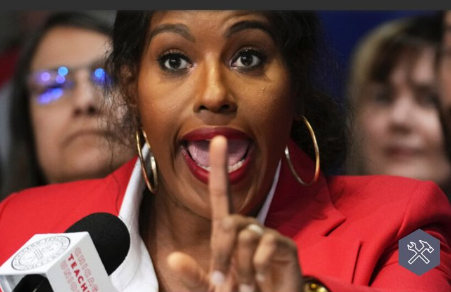
| Published June 25, 2025
In a speech that sent shockwaves across education policy circles and American households alike, Chicago Teachers Union (CTU) President Stacy Davis Gates made a statement many critics view as emblematic of the growing divide between public education institutions and parental authority.
Speaking at a City Club of Chicago event on Monday, Gates declared that “all children belong to” the union, a comment that immediately drew ire from advocates of parental rights, limited government, and school choice. The phrasing struck many as not only tone-deaf but also revelatory of the broader mindset within powerful teachers’ unions.
“Our children belong to us,” Gates said, referencing the Chicago Teachers Union. “We teach them, we guide them, we protect them.”
To some, this might sound like the words of a devoted educator. But to many parents, taxpayers, and even moderate observers, the statement implied something far more unsettling: the notion that the state—or in this case, the union—has primary authority over children, eclipsing the role of families.
Unions and Ownership of Children: A Cultural Flashpoint
This controversy taps into a long-simmering national debate about who ultimately controls children’s education. While unions claim they are safeguarding public education and student welfare, critics argue they are increasingly acting as political actors, pushing ideological agendas rather than focusing on academics and classroom performance.
Teachers’ unions, particularly in large cities like Chicago, wield immense power—negotiating contracts, influencing curriculum decisions, and even affecting election outcomes. But the fallout from prolonged COVID-related school closures, declining test scores, and union opposition to reform has eroded public trust.
Trump, the Department of Education, and Civil War Rhetoric
During the same speech, Gates took aim at former President Donald Trump, slamming his proposal to eliminate the U.S. Department of Education if reelected. She framed the move as a step backward, describing it as a “relitigation of the Civil War”, though she did not clarify the historical comparison.
Trump’s proposal has gained traction among voters who favor decentralized education, parental empowerment, and a reduction in federal influence over local schools. Gates’ response only amplified suspicions among conservatives and moderates that unions are using inflammatory rhetoric to protect bureaucratic structures—many of which have failed to serve students effectively.
A Crumbling School System Under Union Watch
Ironically, Gates also lamented the deteriorating condition of Chicago Public Schools, the very system her union helps lead. From infrastructure decay to classroom violence and plunging literacy rates, the problems are systemic—and long-standing.
Parents have increasingly turned to charter schools, homeschooling, and private alternatives—not out of luxury, but necessity. The CTU, meanwhile, has often resisted charter expansion and school choice measures, arguing they drain resources from public schools.
Critics contend that unions protect the system, not the students—and Gates’ comments may have given them more ammunition than she intended.
Public Reaction: A Tipping Point?
Gates’ remarks come at a time when trust in public institutions is fragile. For many Americans, especially parents already frustrated with pandemic-era policies, this could mark a turning point in the education debate.
National and local leaders have begun weighing in. Parent advocacy groups, conservative commentators, and even some moderate Democrats have voiced concern over what they see as an escalation in union rhetoric and overreach.
“Our children don’t belong to any institution,” said one Chicago parent. “They belong to us. The union is supposed to serve the schools—not own the students.”
Under Stacy Davis Gates, @CTULocal1:
– Spent $3M in union dues on politics in 2023
– Bankrolled Brandon Johnson’s campaign for mayor
– Ran it’s first reported deficitWhile she burns through dues chasing political power, Chicago’s students can’t read or do basic math. pic.twitter.com/VLRQhW6aa5
— Public Labor Unions Accountability Committee (@PLUACommittee) May 13, 2025
 Implications
Implications
-
Erosion of Parental Authority
Her words fuel the growing concern that public education institutions are attempting to usurp the traditional role of parents, treating them more as obstacles than partners. For many, this reflects a mindset where families are expected to defer to ideological or institutional authority. -
Unions as Political Power Centers
The union’s framing of children as belonging to it signals a broader politicization of education, where unions position themselves not just as worker advocates, but as social and cultural gatekeepers. That shifts the focus from academics to activism. -
Loss of Public Trust
With public schools already struggling—especially in major cities like Chicago—this kind of rhetoric could further alienate parents, accelerating the trend toward school choice, homeschooling, and private alternatives. -
Fuel for Education Reform Movements
Gates’ comments may give more momentum to calls for decentralizing education, defunding or abolishing the Department of Education, and expanding vouchers or charter school access. -
Political Polarization
By linking Trump’s education plan to the Civil War and invoking extreme imagery, Gates may unintentionally harden partisan divides, making it harder for moderate voices to participate in reform discussions without being labeled or dismissed.
💬 Overall Takeaway:
Stacy Davis Gates’ declaration that “all children belong to” the union may have been an attempt to emphasize community and collective responsibility, but the phrasing—and the mindset it appears to reflect—has ignited a firestorm of concern across the country. To many parents and observers, her statement was not just a rhetorical misstep, but a revealing glimpse into the ideological posture of teachers’ unions that increasingly behave like political entities rather than educational partners.
This controversy does not exist in a vacuum. It emerges against the backdrop of declining public trust in institutions, a wave of educational underperformance, and growing frustration over school closures, curriculum battles, and parental exclusion from key decisions. For many families, especially in underserved communities, public schools have ceased to represent hope and opportunity, and instead reflect dysfunction, bureaucracy, and ideological rigidity.
By positioning the union as the central authority over children’s lives, Gates inadvertently underscored the gulf between parents and public school leadership. Her remarks confirmed the fears of those who believe the education system has strayed from its core mission of equipping students with knowledge and skills, and is now focused on preserving power and promoting agendas—often at odds with family values and local priorities.
At stake is more than just a battle over words. This moment is a reflection of a much deeper national debate about who children ultimately belong to—families, communities, or the state. And as more Americans begin to scrutinize where their tax dollars go, how their children are taught, and who gets to make those decisions, unions like the CTU may find themselves increasingly out of step with the very people they claim to serve.
The road ahead will likely be marked by greater demands for transparency, accountability, and school choice. If Gates’ words serve any purpose, it may be to awaken more parents to the fact that their role in their child’s life is not negotiable—and certainly not transferable to any union.





Be the first to comment